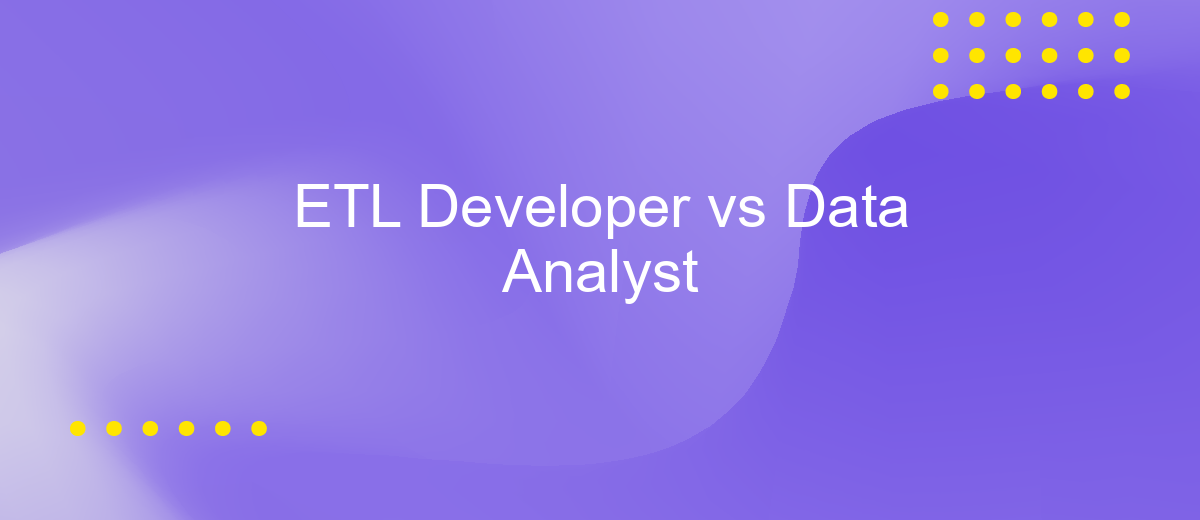ETL Developer vs Data Analyst
In the rapidly evolving landscape of data management and analytics, two key roles often come into focus: ETL Developer and Data Analyst. While both positions are crucial for leveraging data to drive business insights, they serve distinct functions and require different skill sets. This article explores the core responsibilities, skills, and tools associated with each role, helping you understand their unique contributions.
Introduction
In the rapidly evolving world of data management, understanding the distinct roles of an ETL Developer and a Data Analyst is crucial for businesses aiming to leverage their data effectively. Both positions play vital roles in transforming raw data into actionable insights, yet their responsibilities, skill sets, and tools can differ significantly.
- ETL Developers focus on Extract, Transform, Load processes, ensuring data is accurately moved from source systems to data warehouses.
- Data Analysts interpret complex data sets to provide actionable insights and support decision-making processes.
- Tools such as ApiX-Drive can streamline data integration, benefiting both ETL Developers and Data Analysts.
By understanding the unique contributions of ETL Developers and Data Analysts, organizations can better allocate resources and optimize their data strategies. Whether it’s through sophisticated ETL processes or insightful data analysis, the synergy between these roles is key to unlocking the full potential of data-driven decision-making.
Roles and Responsibilities

ETL Developers are primarily responsible for designing, developing, and maintaining data pipelines that extract, transform, and load data from various sources into a centralized data warehouse. They ensure data quality and integrity, automate data workflows, and optimize performance. ETL Developers often work with tools and platforms like Apache NiFi, Talend, and Informatica, and may use services like ApiX-Drive to facilitate smooth and efficient integrations between disparate systems.
Data Analysts, on the other hand, focus on interpreting and analyzing data to provide actionable insights. They use statistical tools and software such as SQL, Python, R, and Tableau to generate reports, dashboards, and visualizations. Data Analysts work closely with business stakeholders to understand their data needs and translate raw data into meaningful information that supports decision-making processes. Their role is crucial in identifying trends, patterns, and anomalies that can drive strategic initiatives and improve business outcomes.
Skills and Qualifications

When comparing the roles of ETL Developers and Data Analysts, it's crucial to understand the distinct skills and qualifications each role demands. Both positions require a strong foundation in data handling, but their specific competencies diverge significantly.
- ETL Developer:
- Proficiency in ETL tools and processes, such as Informatica, Talend, or Apache Nifi.
- Strong SQL and database management skills.
- Experience with data warehousing solutions like Amazon Redshift or Snowflake.
- Knowledge of programming languages such as Python or Java for custom ETL solutions.
- Familiarity with integration services like ApiX-Drive for seamless data flow across platforms.
- Data Analyst:
- Expertise in data visualization tools like Tableau, Power BI, or Looker.
- Strong analytical skills and familiarity with statistical software such as R or SAS.
- Proficiency in SQL for data querying and manipulation.
- Understanding of business intelligence and data storytelling techniques.
- Basic knowledge of ETL processes to comprehend data flow and integration.
While ETL Developers focus on the technical aspects of data extraction, transformation, and loading, Data Analysts concentrate on interpreting and visualizing data to inform business decisions. Both roles are integral to a data-driven organization and often collaborate to ensure data integrity and accessibility.
Career Path

The career paths for ETL Developers and Data Analysts, while overlapping in the realm of data, offer distinct trajectories and opportunities for growth. An ETL Developer focuses on the extraction, transformation, and loading of data, ensuring that data flows seamlessly from various sources into a data warehouse. This role often requires strong programming skills and familiarity with tools like SQL, Python, and ETL platforms.
On the other hand, a Data Analyst interprets data to provide actionable insights, often using statistical tools and software like Excel, R, or Tableau. They play a crucial role in helping organizations make data-driven decisions by analyzing trends and patterns.
- ETL Developer: Strong programming skills, experience with ETL tools, knowledge of database management.
- Data Analyst: Proficiency in statistical analysis, experience with data visualization tools, strong analytical skills.
For those interested in integrating data from various sources without extensive coding, services like ApiX-Drive can be invaluable. ApiX-Drive simplifies the process of setting up integrations, making it easier for both ETL Developers and Data Analysts to manage and utilize data efficiently. Whether you choose to specialize as an ETL Developer or a Data Analyst, both paths offer rewarding careers with opportunities for continuous learning and development.


Conclusion
In conclusion, both ETL Developers and Data Analysts play crucial roles in the data management ecosystem, yet their responsibilities and skill sets differ significantly. ETL Developers focus on designing, implementing, and optimizing data pipelines to ensure seamless data integration and flow across various systems. They are responsible for extracting, transforming, and loading data, often employing tools like ApiX-Drive to streamline these processes and enhance efficiency.
On the other hand, Data Analysts concentrate on interpreting and analyzing data to generate actionable insights that drive business decisions. They utilize statistical methods and data visualization tools to uncover trends and patterns within the data. While both roles require a solid understanding of data, ETL Developers are more involved in the technical aspects of data handling, whereas Data Analysts are focused on deriving meaningful conclusions from the data. Understanding these distinctions can help organizations better allocate resources and leverage their data for maximum impact.
FAQ
What is the primary role of an ETL Developer?
What does a Data Analyst do?
How do ETL Developers and Data Analysts collaborate?
Can automation tools be used to streamline ETL processes?
What skills are essential for an ETL Developer compared to a Data Analyst?
Apix-Drive is a universal tool that will quickly streamline any workflow, freeing you from routine and possible financial losses. Try ApiX-Drive in action and see how useful it is for you personally. In the meantime, when you are setting up connections between systems, think about where you are investing your free time, because now you will have much more of it.

